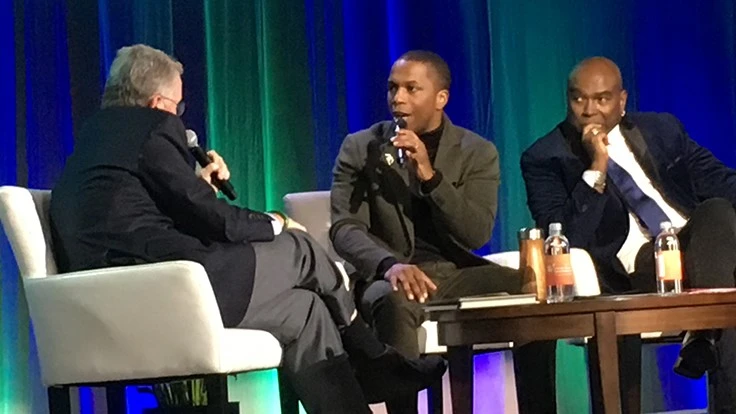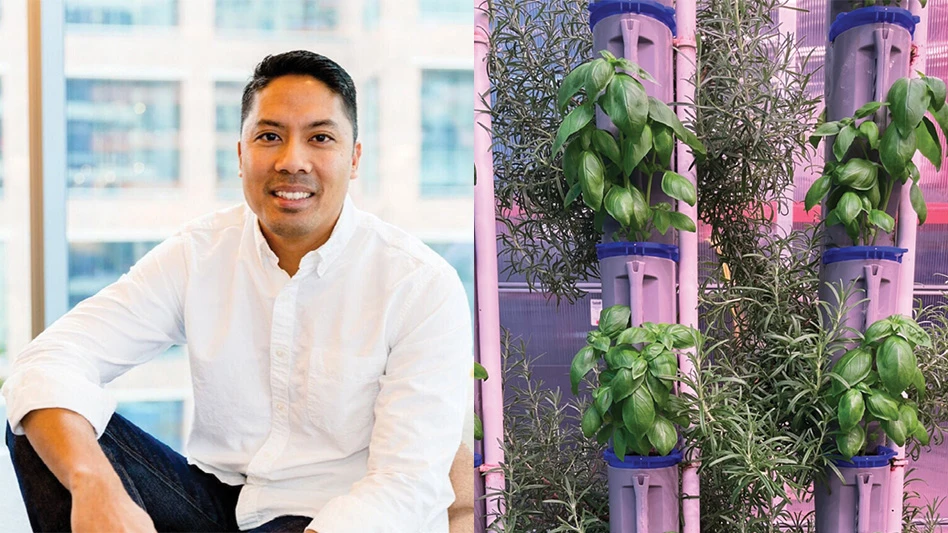
Leslie Odom, Jr. (center), with Kevin Coupe (left) and Stuart K. Robinson (right)
Photo: Patrick Williams
Actor and singer Leslie Odom, Jr., who won a Grammy and a Tony award for his role as Aaron Burr in the Broadway musical “Hamilton,” spoke at Produce Marketing Association’s (PMA) Fresh Summit event in Orlando, Florida, on Oct. 18.
Odom, whose book “Failing Up: How to Take Risks, Aim Higher, and Never Stop Learning” was published earlier this year, was joined by his mentor — and father-in-law — Stuart K. Robinson and Morning News Beat’s Kevin Coupe to discuss how Odom has “failed up,” as well as how others can succeed. The conversation touched on topics ranging from how to take initiative, why to embrace diversity in a team and how to find everyday inspiration. Below are some of Odom’s and Robinson’s lessons.
Try better.
Six years ago, before he acted in “Hamilton,” Odom was tiring of the highs and lows of acting and considered quitting. He sat down with Robinson to talk about a possible career transition. “It was like, ‘How can I take this skill set — these things that I'm good at — and put [them] into something else? Is there something else I can do with my life that will make me just as happy?’” Odom said he asked Robinson. “Stuart said, ‘Sure, you can quit. That's fine. We can talk about those things. Love to see you try first. I'd love to see you try before you quit.’”
Odom clarified that at the time, he thought he was trying. But he recalled that Robinson told him that he thought Odom was “waiting for the phone to ring,” and Odom saw truth in that. He said Robinson challenged him to take more initiative to find work and improve his situation. “From that day forward, I have not stopped working in six years because of that advice,” Odom said. “I'm never, ever, ever sitting on my couch waiting for the phone to ring. I just made changes.”
At Odom’s prompting during the PMA discussion, Robinson cited three things that will get people where they want to go, so they can not necessarily try harder, but “try better.” The first thing is knowing who you are — “not your title, not your name, not your family name — who you are,” Robinson said. The second thing is knowing what you do. “I’d ask in the audience right now and someone would say, ‘Well, I'm in produce,’ or ‘I'm in flowers,’ etc. That's not what you do. What is it you do as a restaurant owner, as a venue director, etc.? What is it you do, what is it you provide?” The third thing is knowing why you’re here, Robinson said, giving this example: “Why we're here is not just to tell you stories, etc., but to find some way to make a difference in your life — to have you leave this room saying, ‘That inspires me to do something better, to try better.”
Follow your dreams.
Odom also found success by deciding to do what felt right for him. After he took Robinson’s advice to "try better," more opportunities began to open up. He had signed a $500,000 contract for a TV show in Los Angeles but was reconsidering because he was drawn to the off-Broadway first production of “Hamilton,” which paid $400 a week.
“I tried to get comfortable with the money — I really did,” Odom recalls. “I was like, ‘My mom needs a roof,’ ‘I don't know how we're going to live off $400 a week.’ But ‘Hamilton’ — it was the most extraordinary thing I'd ever read. There were no guarantees about any of it. There was no guarantee for Broadway or awards — any of that stuff. This is an off-Broadway show. I bet on myself. I bet on myself and this team that I was a part of, and I took the risk. The bigger the risk, the bigger the reward.”
Once Odom decided he wanted to perform in “Hamilton,” he had to figure out a way to get out of his contract with NBC. “Lawyering up” against the network was not an option, he said, considering the large group of attorneys it keeps on its payroll.
“After a bunch of sleepless nights, it was like when you call the cable company and you're like, 'My cable is on the fritz,’ and they start with, ‘Okay, is it plugged in’ ‘Okay, is it on?’ ‘Great, batteries in the remote control?’ It’s troubleshooting,” Odom said. “You have to start with those first simplest steps. The idea happened, like, ‘Why don't you ask? Why don't you go to NBC and ask them to let you out of this contract?’ It was radical!” So that’s what he did, and they let him out of the contract.
Work with a dedicated and diverse team.
The creators and cast and crew members of “Hamilton” offered insight into what makes a successful team, Odom said. “Some of you have worked for people who have been sometimes afraid to have somebody working under them who might be better at a certain thing than they are, might be a little faster at a certain thing — but I was with a world-class team, and there were no limits,” he said. “We were encouraged to fly as soon as possible and as high as possible."
The “Hamilton” team was aware that at any point, anyone could have derailed the entire show, whether it was Odom; Lin-Manuel Miranda, the creator and actor playing the title character; the lighting designer or the costume designer. “If ‘Hamilton’ had had weird costumes, or if the set kind of was lame, or if the press rollout was whack — any one of those things could have derailed the entire thing,” Odom said. “When there's a win like ‘Hamilton,’ there are a lot of people to thank. It's a miracle.”
“Hamilton” used a diverse cast to tell the stories of its historical characters, who were white. Odom explained that he grew up watching Tom Cruise and Harrison Ford on the silver screen. Now, though, for the first time, people who come from diverse backgrounds are seeing and empathizing with leading actors such as Odom, who is black, and Miranda, who is of Puerto Rican descent.
A diverse team brings new perspectives and ideas to the business world, too, Odom said. “If you have someone on your team — if you have been conscious enough to build a team and diversity is something that you've been able to inject into your business and your business model — tap those people for those unique experiences,” he said. “If it's a room full of guys and you have one or two women, there might be a different perspective — I'm sure there is a different perspective. I'm sure there is a perspective that can be offered — my wife would agree — from the woman at the table.”
Be inspired.
Inspiration is a crucial tool to achieving one’s dream, and it can be found anywhere, Odom said. “The old lady on the elevator next to you, the little kid walking towards you who lets the balloon go and doesn't care — it's just all around you, so soak that stuff up. We need it."
Odom took a note from Robinson, who wrote his own book, “It All Begins With ‘I’” to share with the audience his own answer to his mentor’s “Why are you’re here” question. “I feel like my mission, or what I'm here to do, is to empower people, to connect with people,” Odom said. “I'd be doing that if I was working at a bank, or I'd be doing that if I was teaching third grade or I'd be doing that whatever my business was. Once I identify those things, I can do them anywhere, on any level, in any room.”
Latest from Produce Grower
- Consumer Curiosity Report explores food, nutrition opinions from 'early adopters'
- Your comprehensive guide to Indoor Ag-Con ’25
- Sollum Technologies and Indoor Ag-Con announce recipients of Sollum Student Scholarship
- 80 Acres Farms expands to Georgia, Texas and Colorado
- This fast and agile robotic insect could someday aid in mechanical pollination
- AmericanHort urges exclusion of sphagnum peat moss from proposed Canadian tariff
- The Growth Industry Episode 2: Emily Showalter on how Willoway Nurseries transformed its business
- Moleaer expands irrigation product line featuring nanobubble technology





